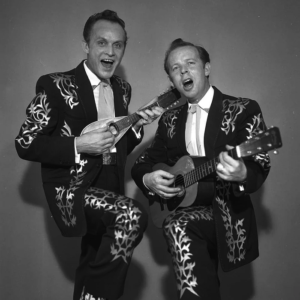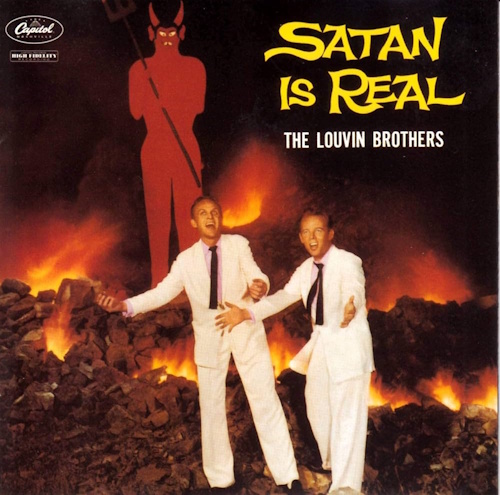Beacon musicians pay tribute to old country duet
There are two tenuous Beacon ties to the country brother duets, a Southern tradition whose heyday stretched from the 1930s to the 1960s and culminated with the pop chart-topping Everly Brothers from Kentucky.
One is Harry Bolick, co-author of Mississippi Fiddle Tunes and Songs from the 1930s, who believes he may be distantly related to Bill and Earl Bolick of western North Carolina, better known as the Blue Sky Boys.
The other is Josh Stark and Christopher “Feff” Zezza, who created a tribute to the magical, tragical Louvin Brothers, an obscure act that charted 10 Top-20 country hits from 1955 to 1961.

Performing as the Lousin’ Brothers, Stark and Zezza opened earlier this month for the Wynotte Sisters at the Southern Dutchess Country Club, their unlikely project conjuring the tight harmonies of the distinct style, in which one singer sticks to the melody and the other locks in with a higher part.
Like the Louvin Brothers, Stark and Zezza crossed over and switched roles effortlessly, sometimes making it difficult to tell who delivered the lead.
The duo’s rhythmic interplay during guitar breaks complemented the haunting harmonies of “He Can Be Found” and “I Wish It Had Been a Dream.” They also played — and praised — “A Tiny Broken Heart” from the album Tragic Songs of Life, which centers on a 7-year-old boy watching his playmate move away.

“The music is beautiful, but you can hear the edge, and no one writes lyrics like that,” says Stark, who discovered the Louvins while playing in a Brooklyn band before he moved to Beacon 20 years ago. “There’s even a subtle critique of capitalism in there.”
Stark brought the tribute concept to Zezza, who knew nothing about the brothers but became enamored. “I’m attracted to the feeling behind the songs, especially when they sing about god,” says Zezza. “There’s a lot of longing but also a sense of hope made beautifully complete by the music.”
The relationship between Ira and Charlie Louvin, natives of Alabama, dissolved over older, taller brother Ira’s temper and alcoholism (he survived getting shot by his third wife). By 1963, Charlie went off on his own. Two years later, Ira died in a car crash at age 41, along with his fourth wife. Charlie lived to 83 and had four Top-10 singles on the country charts.
“You know that they’re living what they sing about, so the fire and brimstone isn’t finger-pointing or holier-than-thou,” says Zezza. “They try to live well but do a poor job of it.”
The duo’s moniker evokes losing, “not as a put-down, but in a winking, sarcastic, punk rock way,” says Stark.
Stark and Zezza’s performance of “Kneeling Drunkard’s Plea” earlier this month cut to the bleak song’s core. With a dying (and dead) mother central to the verses, the chorus refrains, “Lord have mercy on me / Was the kneeling drunkard’s plea / And as he knelt there on the ground / I know that God in heaven looked down.”
The song comes from the album Satan is Real, whose cover art may be more popular than the music. “It looks like Photoshop, but it’s a giant plywood Satan in front of a tire fire, as they pose awkwardly,” says Zezza.

For Stark, another attraction to the duo is that “there’s tension but also a lot of love. Sometimes you don’t notice the darkness of the lyrics because of the sweet delivery of the music. That’s what makes it pop.”


I’ve loved the Louvin Brothers since I first heard Emmylou Harris’s cover of “If I Could Only Win Your Love” in the 1970s. I’d welcome a chance to hear the Lousin’ Brothers pay tribute!